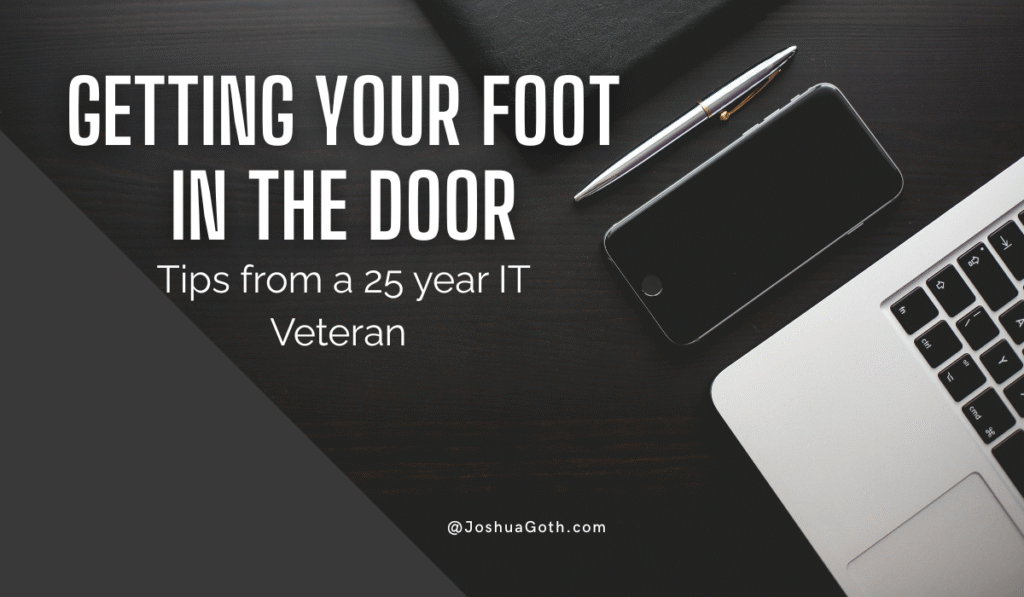How To Land a Job in IT Without Prior Work Experience
Getting hired can be difficult enough, but getting hired without any experience is damn near impossible. After all, how can you get hired without experience in order to obtain the experience you need in order to get hired in the first place?
I hope to answer that question for you.
I will be writing this with the assumption that you do not have any work history, a fresh degree, and not a whole lot of real world experience. Please pick and choose what applies to your unique situation according to your skill set and what you feel comfortable with.
Below is a complete dump of my collective knowledge over the course of a 25 year career as a network administrator / engineer. Included are career and interview hacks that come not only from my perspective as an interviewee, but what I looked for in a candidate when I was tasked with hiring a new member for the team.
Chicken and the Egg is a common conundrum for many new professionals (in any discipline); How do obtain the experience needed to find employment when every company requires experience in order to get hired in the first place?
The Ugly Truth
Most companies either do not ask, or do not verify your education. Out of a 25 year career and countless positions I have applied and worked in, only one required college transcripts. Most other positions, listed a degree as a requirement, but never verified my degrees or checked to see if my certifications were up to date.
Okay, so companies don’t care so much about your degree, or if they do, they rarely verify your degree..so, what do employers look for? How are tech folks classified?
Certifications
These are critical. Every certification under your belt tells an employer the level of understanding you have in your discipline, and more importantly (for you) provides you with the needed foundation that you will continue to build upon for the remainder of your career.
CompTia Network+ No matter what discipline you decide to choose, if you are wanting to get into anything network related (security, penetration testing / auditing, analytics), you need a strong understanding of the OSI model, and that begins with CompTia’s Network+ Certification.
CompTia Security + The basics of network security. Building off of the foundations of Network+, you will learn best practices and further fundamentals that you will carry with you throughout your career.
- PRO TIP: I suggest to have at least these two certifications under your belt before you begin applying for jobs. Not only will you have a greater chance to land an interview, you will have a better chance at making it past the initial phone screen.
Those certifications alone will land you an entry level job in either Systems or Network administration. The next step in your career is a big one, but will take you to the next level. The following path is not for the faint of heart. Even working with the equipment I was attempting to get certified for and studying for months before attempting to take the exam, I failed twice before passing it.
CCNA: Cisco Certified Network Associate. This is a game changer and it is where employees start to take you seriously. When you start down the Cisco certification path, you are making yourself an asset; one that starts with double the salary that basic administration brings in.
From there, you can decide which path you want to take. If you have your CCNA, you are well on your way to knowing where you are wanting to go with your career. If you choose the security path, I suggest starting with CE | H, or certified ethical hacker. Much of what you study from this point out is not just resume fodder, it’s to build your person skillset.
- PRO TIP: More often than not, when you see a job posting for Jr. anything, it does not mean they are seeking someone without experience. It means they are unable to afford to pay you the going rate for the listed position.
Tools and exercises to start building your arsenal with
Putty / WinSCP: Any terminal emulator of choice, but this is your gateway to all the work you will be doing, so get used to the terminal / command line. This is command line access to the devices that you will be managing. Familiarize yourself with using a terminal to connect to networking equipment / remoting into servers.
Linux: get to know the basics, if nothing else. I suggest you install Mint or Ubuntu as a primary operating system, and get familiar with navigating the file system. Every network engineer worth a grain of salt can build / run / navigate Linux—There is no way around this.
Home Lab: Start building things. Create a home lab. Break stuff. Fix it. Learn. Create a media server. Build a Prox Mox hypervisor so that you can spin up and create multiple servers / containers to run and learn applications.
- Segregate your network Go to a thrift store and pickup some old routers. Install custom firmware (DD-WRT / Open-WRT). Build a home firewall with PfSense (physical or virtual). All of the aforementioned titles have many features that you will see / use in the industry.
- Build a hypervisor Setup ProxMox and then start building servers on your home network. Setup an Ad-Blocker, DNS Server, File Server, Home Automation, Backup Server, Media server, etc., Go nuts.
- Build Virtual Machines / Containers within ProxMox Setup an Ad-Blocker, DNS Server, File Server, Home Automation, Backups, Media Server, Go nuts. A great place to run automated Container / VM installs on ProxMox can be found here: https://community-scripts.github.io/ProxmoxVE/scripts?id=adguard
- Break Things Thats how you learn. Period.
Resume building
Now for the information that I am sure many of you are here for; How to build a resume with no experience and land job interviews with it.
I strongly suggest that you follow my advice so that you are familiar and confident with the tools, and fundamentals that you will need in order to start managing equipment on a professional level, because if not, nothing you put on your resume will matter if you are unable to do what you say you can, not to mention being able to answer basic tech questions on the interview.
I am going to be honest, because what I am suggesting isn’t. You are going to need to stretch the truth a little bit— or rather—create a truth and then stretch that. Now is the time you create your own work history, and here is how you do it:
Pro Tip: You can BS a resume as much as you like, but DO NOT list certifications that you do not have. Your knowledge and responses to questions will let employers know that you are full of shit if you are unable to answer a question that relates to a listed certification. Don’t cut corners on your real-world education. Ever.
Freelance & Contracting
Although you have yet to be employed by an actual company, you can fill your experience with contract work. If you are confident enough with your skills (in other words, you could successfully freelance on your own), let’s, for the sake of getting your foot in the door, say that this is what you have been doing.
There are many apps that seek out professionals for short term contract work. Companies usually need a specific job done (equipment setup, move, installation, or any type of technical build), especially smaller companies that do not have an IT department, they post an ad on either Craigslist, Offer Up, etc.,.
This is where you create a contracting work history for jobs that you have done. Now, I know this isn’t the most honest approach, and, if you are confident enough with your abilities at this point, can start applying for these small gigs. Unfortunately, the same problem arises, gig employers ask to see your resume, and you have nothing listed so they opt for someone with more experience.
This is the unfortunate nature of things. The goal here is to get your foot in the door—fake it until you make it—learn what you said you knew while you are working the job. Once you are in, leave the bullshitting behind you.
What information is actually verified
Employers will not waste your time with trying to verify gig jobs. They will ask you just to get a feel of your experience, that’s all. As a matter of fact, only companies that use a background service—in my experience—verify employment that you have listed on your resume.
PRO TIP: My advice for you when you are claiming the ladder is not to burn bridges. You are required to list at least three professional references. Higher on the food chain that you list, the better it is for you. Just keep that in mind as you move forward in your career.
The Interview process
I’ve been on both sides of the table. Below are the tricks I have learned in landing a position, and choosing someone to hire.
- A Game of Psychology If you have made it past the initial phone screen and follow up phone interview, congratulations. The next part of this process doesn’t require technical know-how, but instead it is about psychology and rhetoric. At this point, management has a pretty good idea about your technical background and now they want to get to know the you.
- Control the Mood; Control the Conversation The word manipulation, in my opinion, has too many negative connotations, but it is what it is, and right now you need to manipulate the conversation in your favor. It is easier to hire a friend than it is a stranger, so be as open and friendly as though you have known this person for years.
- Study the Environment Look around the office, try to gauge the type of person who is interviewing you and make a connection. See a fish theme? Strike up a conversation about how much you like to fish (even if you don’t). Make a personal connection—any connection.
- Be Like able Joke. Laugh. Not only does it ease the tension of the entire process, it helps paint a picture of who they are considering hiring. I have had interviews where I was not asked a single technical question, but instead spent an hour talking about the outdoors, sports, etc, and was offered a position an hour after the interview.
- Buzz Words Do your homework. Spend some time learning key words about what the employee is hiring for. Employers will itemize a list of everything they are looking for in their job posting. For the technology / applications that you may not be as familiar with, spend some time on You Tube learning about it. Dropping the proper lingo on a specific topic, adds credibility to your knowledge. I always brush up by watching You Tube before an interview, and it has saved my ass more times than one.
- Honesty I know I am being a bit of a hypocrite when I ask you to be honest, considering the advice I gave for building experience on your resume, so when I say be honest, what I really mean is to be humble. It is okay to admit you do not know something, or that you are just starting out. In this field, there is nothing more dangerous than someone who thinks they know something they don’t or because they are afraid they will look foolish if they admit the truth. This is how company wide shit-storms of biblical proportions begin. Don’t be that person.
- Confidence Above all, be confident. Speak clearly and with authority. Keep eye contact as you speak. Sit up straight. Confidence is a trait that stands out above all else, and it is one trait that speaks volumes through body language alone.
Quotes that have landed me jobs
I have dropped the same one-liners at the end of every interview, leaving a strong impact and impression. Much like an ending a good book or movie with a bang, a properly timed one-liner can be the difference between another job interview or the first day on the job.
- “It is not about what you know, but instead how fast you can fix what you don’t know.”
- My favorite quote of all time, which speaks volumes about the type of individual you will be if hired, comes from Abraham Lincoln: “If I had six hours to chop down a tree, I would spend three sharpening the Axe.”
- “The only way, I feel, that someone can really fail is if they do not learn from their mistakes.”
Background Checks
There is no way around a criminal background check. However, if you do have a record, there are ways around that if you have an understanding of how the background check process works. Due to the shady nature and legalities involved, I will not be listing those here, though, sorry.
Drug Screens
For those who like to partake recreationally, you are in luck. I have never been drug tested for any position that I landed during my entire career of over 25 years.
I hope any and all of this information helps you get your foot in the door. Remember, us tech folks are a dime a dozen. So, Stand out and be memorable and engaging. Ask questions. Show enthusiasm. You got this!
I wish you all the luck in the world!
~Cheers



